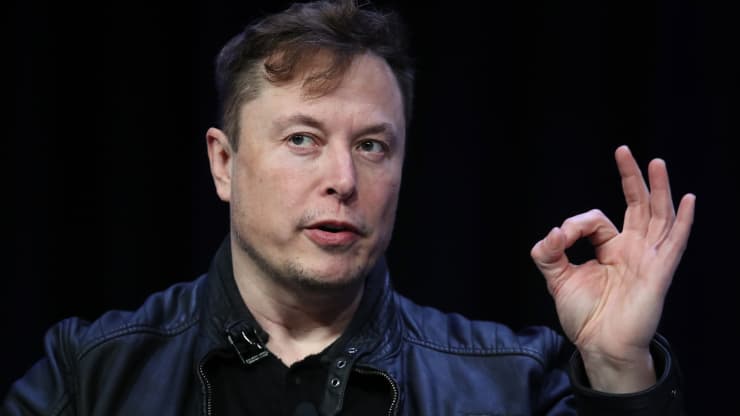
Win McNamee | Getty Images
Bitcoin’s price fell Friday morning after Elon Musk posted a tweet suggesting he’s fallen out of love with the world’s top cryptocurrency.
The billionaire Tesla CEO tweeted a meme about a couple breaking up over the male partner quoting Linkin Park lyrics, adding the hashtag #Bitcoin and a broken heart emoji.
Bitcoin fell nearly 6% to a price of $36,432 at around 3 a.m. ET Friday, according to data from Coin Metrics. Other digital coins followed suit, with No. 2 cryptocurrency ether dipping 7% to $2,600 and dogecoin — Musk’s favored crypto — sinking almost 8% to around 36 cents.
Bitcoin has had a wild year, reaching a record high of more than $64,000 in April, only to then plummet to nearly $30,000 the following month. It’s now more than 40% off its all-time high, though still up almost 30% so far in 2021.
It’s not the first time Musk’s tweets about crypto have moved the market. In May, he said that Tesla would stop accepting bitcoin as a payment method due to concerns over its energy usage, shaving hundreds of billions of dollars in value off the entire crypto market in a single day.
In a new note this week, JPMorgan said institutional investors were not buying the dip in bitcoin, and suggested prices may have further to fall.
Bitcoin’s proponents view the digital currency as a store of value similar to gold, arguing it can act as a hedge against inflation as central banks around the world ramp up stimulus in response to the coronavirus crisis. But skeptics say bitcoin is a speculative bubble waiting to burst.
Thousands of bitcoin investors have descended on Miami this week for a conference dedicated to the cryptocurrency. Miami Mayor Francis Suarez is himself a believer in bitcoin, telling CNBC Thursday that the city is “actively looking at” paying employees in crypto.
“I think crypto is just fake money,” Andrey Kostin, chairman of Russia’s VTB Bank, told CNBC’s Hadley Gamble at the St. Petersburg International Economic Forum on Friday. “Somebody’s sitting somewhere mining and mining like in the Middle Ages and then using them.”
“No government will accept it because it’s not under any government regulations,” he added. “They can’t control it.”
Kostin alluded to several central bank initiatives to develop digital versions of existing money like the dollar, the euro, the Chinese yuan or, in Russia’s case, the ruble.
“It’s inevitable,” he said. “The whole world is moving to a digital world. And currency is not excluded from this process.”

